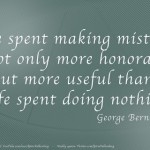 Failure is a lot more popular these days than it perhaps was in the past. The notion is that if you’re not failing then you’re not trying sufficiently challenging things, and thus not progressing, either as an individual or as an organization, as much as you might otherwise do.
Failure is a lot more popular these days than it perhaps was in the past. The notion is that if you’re not failing then you’re not trying sufficiently challenging things, and thus not progressing, either as an individual or as an organization, as much as you might otherwise do.
Suffice to say, the key to failing successfully is to learn from your experience so that you become better as a result of it. As you can perhaps imagine therefore, having the right approach to your mishaps is key. Treat them as an opportunity to learn and develop yourself and you’re probably in good stead. Think of your setbacks as a negative reflection on your abilities however and it’s much less likely that you’ll learn from them as a result.
A classic study from Joseph Martocchio underlines this point nicely. The study saw a group of professionals participating in a computer training course. Before beginning their studies however, the group were induced to believe various traits about their ability to learn. Some for instance were encouraged to believe that their computing abilities were relatively static. Others were given a much more positive outlook and were encouraged to believe that the training would enhance their abilities.
The two groups then proceeded to take the course as prescribed. The trajectory of the two groups from their initial start point was quite staggering. Both groups predictably made mistakes in the early stages of the course, as you’d expect when learning something new, but the way each group reacted to those mistakes was amazing.
The group who were led to believe that their abilities were static reacted terribly to any mistakes they made during the course, and their confidence in their computing ability gradually decreased through the duration of the course.
The other group however were primed to believe that the classes could have a marked impact on their abilities, so tended to regard the mistakes they made as part of the learning process. As a result, both their confidence and their ability rose during the course.
It’s a nice example of what’s known as the Pygmalion Effect. This was first coined by Harvard researchers Robert Rosenthal and Lenore Jacobsen, who observed that students performed better when their teachers believed they had the potential to be great. Their famous experiment saw pupils selected at random and labelled as bloomers, ie children with strong potential. Lo and behold, those students then went on to significantly out perform their classmates.
Doing so however requires the belief that mistakes are ok, just so long as we learn from them. How do you and your colleagues tend to respond to mistakes made whilst at work?
This is the key to success in life generally isn't it? Can't over-estimate its importance.
in business or in life, i never looked at setback as setback, it's just a stepping stone to success for me